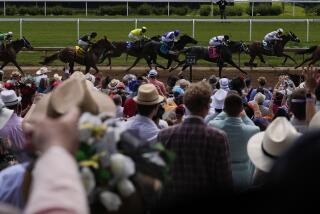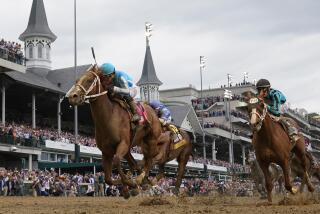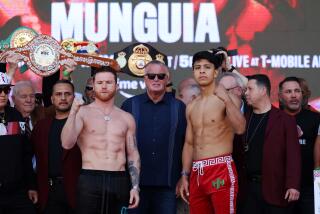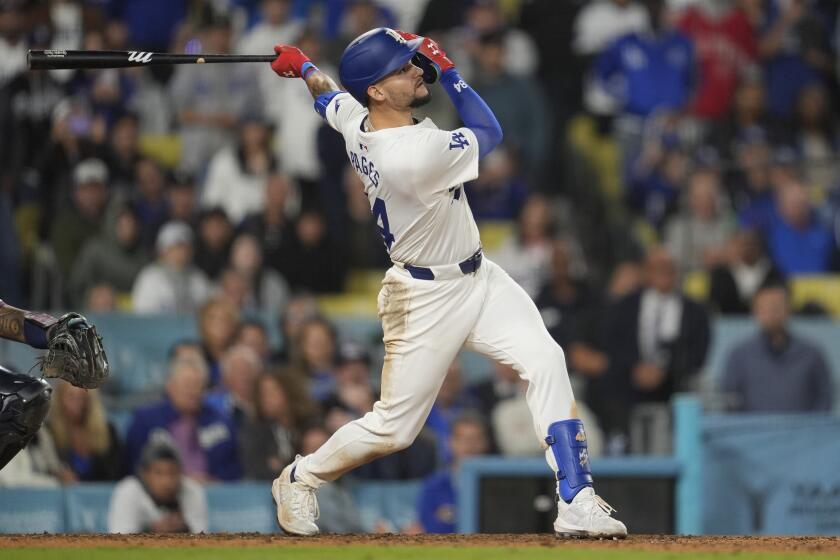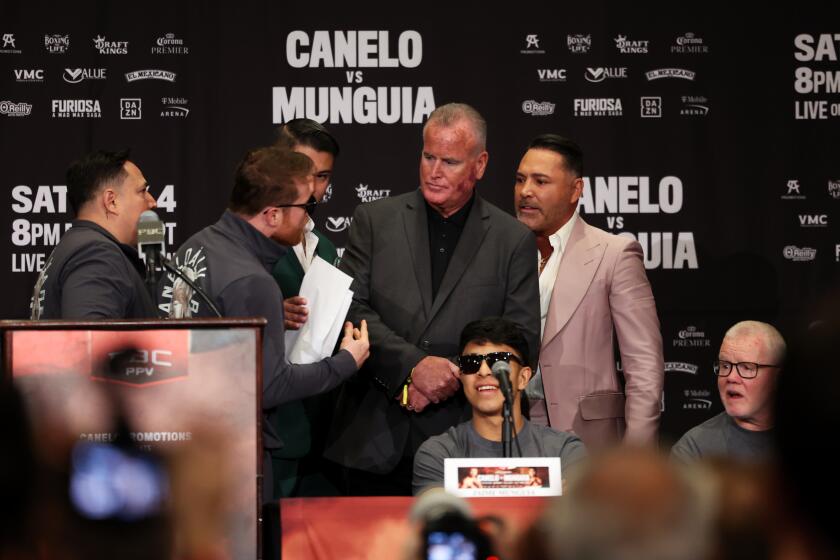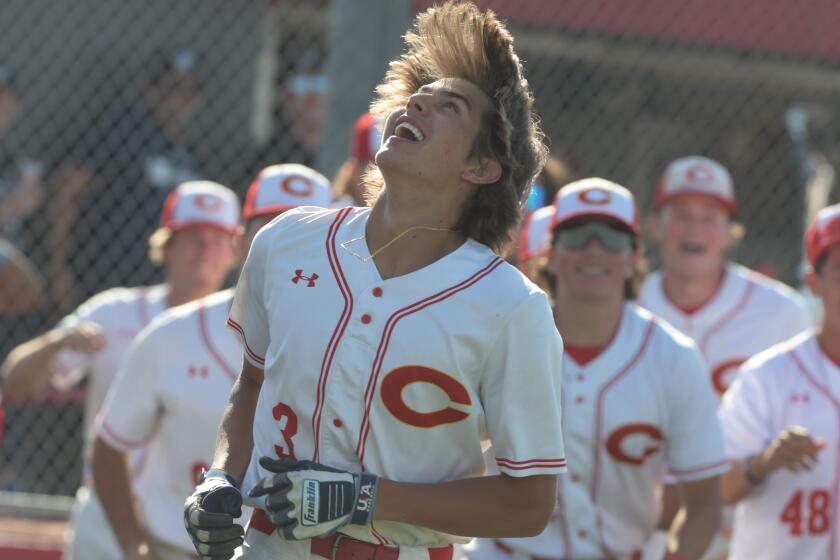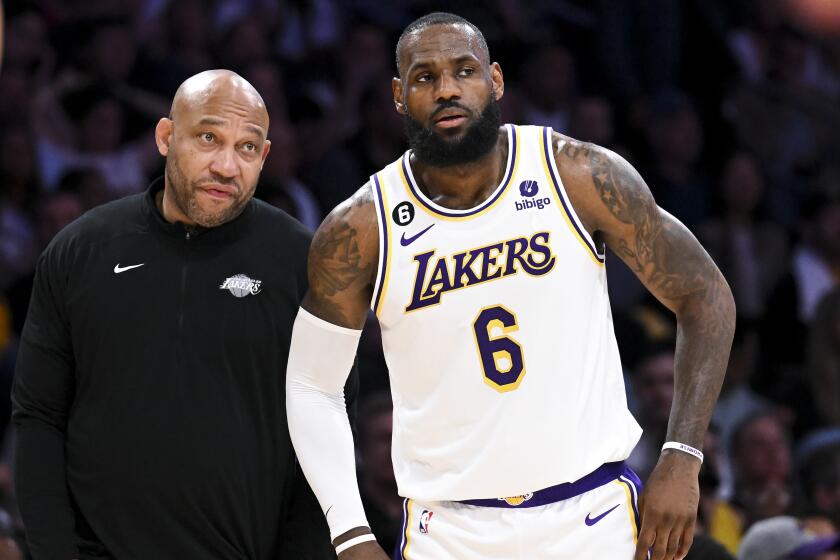BASEBALL / ROSS NEWHAN : Fans Should Be Forgiven if They Pass Up the Party
There have been no celebrations on this anniversary weekend.
It was a year ago that major league players, attempting to use economic leverage against the possibility of unilateral implementation of a salary-cap compensation system by the owners, began a strike that wiped out the final seven weeks of a spectacular and potentially record-breaking season, forced cancellation of the World Series and ultimately delayed the start of the 1995 season.
The ramifications of that eight-month dispute go much deeper, of course. The impact lingers, haunting this summer and baseball’s future.
Consider:
--Attendance remains down about 19%, with 25 of the 28 teams off more than 10% at the gate. Owners estimate losses at more than $800 million since the strike began, and players have dropped more than $600 million in salaries and lower contracts.
--There is still no labor agreement, no likelihood of one before this winter and no unanimity among the owners regarding direction: Some want the salary cap, some a luxury tax, some peace at any price. Likewise, they can’t seem to settle on a lead negotiator. Richard Ravitch is out. Chuck O’Connor is out. Robert Ballow hasn’t become the expected force. The owners are trying to hire Randy L. Levin, head of labor relations for New York City.
--There is no commissioner and no plan to hire a commissioner until the labor situation is resolved. Acting commissioner Bud Selig has made a sincere attempt to lead by committee and consensus, but the public perception seems to be that of a rudderless and indecisive ship.
--Amid lower TV ratings nationally and locally, baseball is devoid of a national television contract after the World Series. There is optimism that Fox or CBS will step into the ABC/NBC breach, but that, too, is not expected to happen until there is a labor agreement.
--With Phoenix and Tampa-St. Petersburg preparing to begin play in 1998, there is no unanimity among the owners regarding alignment. Some favor putting Phoenix in the National League and Tampa-St. Pete in the American, giving each league 15 teams and opening the door to interleague play, providing the AL eliminates the designated hitter. Some favor putting both in the American to avoid having interleague play, with the NL expanding by two in 2000.
--Angered by the absence of a labor agreement and a commissioner, Congress has gone beyond saber rattling and is taking aim at the owners’ 72-year-old antitrust exemption. The Senate Judiciary Committee passed a bill that would eliminate the exemption as it applies to labor, giving the union the option of battling unilateral implementation of new work rules in federal court, and the full Senate may consider the bill after its August recess.
If the 1995 season has appeared to be the equivalent of a survival test, baseball has benefited from Cal Ripken’s pursuit of Lou Gehrig’s record for consecutive games, the arrival of Hideo Nomo, the emergence of the Angels and Cleveland Indians as the AL’s best teams and the ongoing sellouts as the third-year Colorado Rockies bid for a division title in the new launching pad of Coors Field. The wild-card races are also starting to aid attendance--once down as much as 27%--in a season when only the National League West has a serious title race.
It is a season that will be played to completion because both owners and players understand that a second cancellation would be suicide.
On that they can agree, but what happens in the critical off-season is unclear.
The owners are preparing to initiate what Selig calls a Herculean marketing effort through a new and expanded New York marketing division. But what will there be left to market without a labor agreement, guaranteeing stability for fans and sponsors who perceive only greed on both sides and are reluctant to reinvest in an industry that walked out on them once and could do so again?
There have been table-setting sessions between lawyers for the sides in recent weeks, and Selig is optimistic they will lead to real progress.
The union, however, doesn’t share his optimism.
Lawyers for the players wonder how the meetings can lead anywhere if owners are still in the process of hiring a lead negotiator. They fear it’s all part of a protracted scenario in which the owners will ultimately attempt to declare another impasse and implement a salary cap, igniting another round of legal confrontations--and certain death.
On the anniversary weekend, it’s still no waltz for baseball.
ABOUT THAT FORFEIT
One aspect of the unfortunate incident at Dodger Stadium Thursday night--and there’s widespread blame--is that players have privately maintained throughout the season that umpires emerged from their new labor agreement with a security and arrogance that make them difficult to talk to, let alone question.
As part of that new contract, however, the umpires agreed to creation of an impartial committee that will review their performance during the season and file reports to the league offices when necessary.
Umpires were previously rated annually by the managers and clubs, but the clubs have long been reluctant to continue that process, fearing retribution if critical reports became public, leading to the negotiated compromise of an impartial committee that will be paid for its work.
So far, that committee has only two members--former Dodger catcher John Roseboro and former Angel announcer Billy Sample.
“We’re just getting off the ground with the concept,” an American League official said. “We’re just starting to work the kinks out. We hope to have it at full force by next year, although we’ve been having trouble getting people to sign up. The original idea was to have former umpires on the committe, but they seem reluctant to review their peers.
“We’re not looking to fire anyone--that’s a five-year process under the current rules--but we’re hoping to spot patterns of mistakes or bad habits that an umpire can work to break once he sees that members of the committee are turning in similar reports.”
Should Jim Quick not have been so quick to eject key players amid the mounting pressures of the division race?
Probably.
Should Eric Karros, Raul Mondesi and Manager Tom Lasorda, knowing that to argue balls and strikes is certain ejection and that their availability is critical to the Dodgers in August and September, have backed away, breathed deeply and bit their tongue?
Undoubtedly.
Should the Dodgers, knowing in the aftermath of the strike that fans have been closer to the edge and quicker to demonstrate emotions as illustrated by several incidents at the major and minor league levels, have canceled a promotion in which spectators were armed with baseballs?
Well, that’s something of an unfair second guess. Who would have believed that the generally well-behaved Dodger Stadium fans, many of them gone by the seventh inning, would have chosen to hurl those baseballs on the field, threatening injury to the players and umpires and risking a forfeiture that should have been no surprise to anyone.
Fans at all stadiums are warned about possible repercussions from that behavior every night. The game had been stopped once in the seventh inning. The foreiture in the ninth, though a possible pennant-deciding decision, was the right call, even if the P.A. announcer hadn’t made another announcement.
Reflecting on the mounting incidents, it’s clearly time for fans, players and umpires to get a grip--and not on those promotional baseballs.
PENNANT FEVER
If emotions are high among the Dodgers, the Colorado Rockies are also experiencing pressure. A three-game sweep by the Florida Marlins sent the Rockies stumbling toward six straight games in Atlanta and Cincinnati.
The 13-inning 5-4 loss to the red-hot Marlins Tuesday was more than Manager Don Baylor could stand.
“Guys are putting a lot of pressure on themselves in RBI situations, and this is not even the time they should get uptight,” Baylor said. “We have 48 games to play. We’re not down to the last 10, but we’re playing like there are 10 games left. We’re so uptight.”
NAMES AND NUMBERS
The hottest of several Japanese possibilities to follow Hideo Nomo to the United States appears to be Masumi Kuwata of the Yomiuri Giants. Mike Winters, a former slugger in Japan and Florida Marlin replacement player, almost prompted the Giants to file a tampering charge against the Marlins this week after Winters, recently signed by the Marlins and sent to Japan to evaluate talent there, was seen huddled with Kuwata for 15 minutes.
Said Orrin Freeman, the Marlins’ scouting director: “Because of the success of Nomo over here, and the fact that there are other players over there who can compete here quite successfully, I’m sure Japanese teams are a little skittish about it. But we’re just trying to get an idea on which players indeed have a line on coming over here when their contracts are up.
“What I imagine happened is Kuwata is probably a friend of Mike’s, that he played against or with in Japan, and he was just talking to his buddy.”
Right.
*
In 42 games as the San Diego Padres’ leadoff hitter through Friday, Steve Finley has enhanced his postseason status as a free agent by scoring 45 runs, stealing 18 bases, hitting six home runs and batting almost .400.
*
Shortstop Ozzie Smith, 40, expects to return to the St. Louis Cardinals’ lineup by their next home stand. Smith had arthroscopic shoulder surgery and hasn’t played since May 17. With the Cardinals buried in the standings, Smith said: “It’s not very pretty, but I’m excited about playing again.”
*
It has been noted how the Angels’ acquisition of Jim Abbott gives them four left-handed starters, a possible advantage against the Cleveland Indians’ potent lineup in the playoffs. Indian ace Dennis Martinez brought it up again Tuesday after he and his team lost to soft-throwing White Sox left-hander Dave Righetti, 5-1.
“I’m going to learn to be a left-hander so I can come back and pitch against this club,” Martinez said, referring to the Indians. “Any team that pitches a left-hander against us--it’s like the guy is Sandy Koufax. I hope I don’t have to pitch against a left-hander again this year.”
Wishful thinking?
More to Read
Get our high school sports newsletter
Prep Rally is devoted to the SoCal high school sports experience, bringing you scores, stories and a behind-the-scenes look at what makes prep sports so popular.
You may occasionally receive promotional content from the Los Angeles Times.
